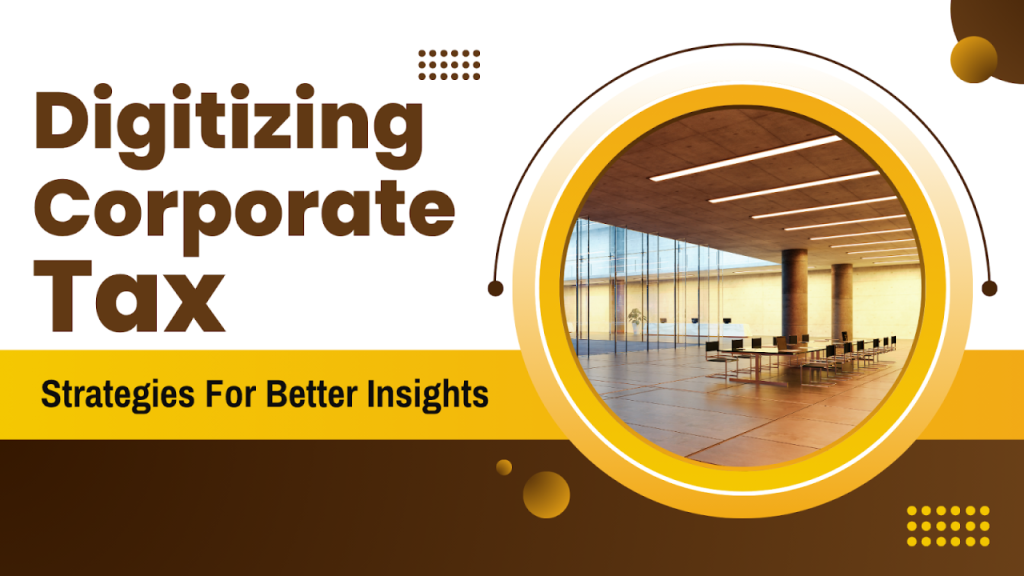Key Points
-
Digital tax boosts compliance and accuracy.
-
Cloud solutions enable real-time tax data access.
-
Seamless integration improves efficiency.
-
Predictive analytics optimize tax strategies.
-
Digital tools cut costs and administrative burdens.
-
Digital tax is key to financial sustainability.
If your organization employs an effective corporate tax strategy, you will find it playing a key role in financial planning by advising businesses on the optimization of tax liabilities while complying with the regulations available. Not only does a well-orchestrated approach to taxes enhance cash flow management, but it also reduces audit risks associated with penalties. Conventional tax planning avails itself mostly of manual processes, often causing inefficiencies as well as mistakes.
With automated calculations, tax management is transforming due to digitization, where compliance is streamlined, and finances are readily available at the fingertips of the organization for real-time insights. Now, many companies are equipped with a cloud-based platform and automated reporting and can now rely on AI-driven analytics for accuracy and better decision-making. So, this completely frees up the organization from the administrative burden, placing it under what could undoubtedly be described as legislation contrary to time.
By embracing digital tax tools, a company can enhance efficiency, maximum accuracy, and compliance. Automation eradicates the manual errors of putting data through integrated systems that produce tax reporting without a hitch, and the insight from AI enhances tax optimization strategy. This article discusses the transformation in ways of corporate tax planning via digitization, the benefits that modern tax solutions provide, and how businesses can adapt to this trail toward better and improved financial management.
The Shift Toward Digital Tax Strategy
By adopting digital tax solutions, companies are enhancing their compliance and operational efficiency in preparation for a long-term successful sojourn into an ever-complex tax environment.
From Manual Tax Processes to Digital Solutions
Corporate tax management has traditionally been about manual processes such as spreadsheets, paper-based records, and complex calculations done in-house by a finance team. These were slow and error-prone ways of developing tax solutions, especially for companies working within multiple tax jurisdictions and the ever-changing ratifications of new legislation.
Digital tax solutions began with basic accounting software applications, but businesses are now looking for higher-end solutions. The current tax tech includes automation, data analytics, and compliance monitoring to help with tax operations in the style of a modern system. Today, instead of manually tracking deductions, credits, and compliance dates, companies continuously consolidate tax data through digital platforms, such as Word file to PDF converter online, that minimize inaccuracies and reduce administrative inefficiencies.
The Cloud in the Tax Sector
Cloud tax software hosts a common environment for businesses to run tax compliance more effectively. Unlike on-premise software, cloud-like solutions allow secure and remote access to current tax data, thus allowing inter-group collaboration regardless of the departments and locations involved. This advantage is especially helpful to multinationals that have to comply with multiple tax law regimes concurrently.
The automatic update of the software is another significant aspect the cloud-based tax software boasts of. Given the changing nature of tax laws, cloud systems ensure that businesses are always working in line with the latest regulations without any manual intervention. Real-time synchronization of data is also essential in ensuring that finance teams prepare correct tax reports and forecasts, thus minimizing the risk of miscalculations and penalties for non-compliance.
Robots/AI in Tax Planning
Artificial intelligence has changed the scene of tax management with automation and predictive abilities. AI tax software renders services in transaction categorization, deduction identification of expenses, and tax forecasting based on the past. Reduced human errors and an accelerated pace of processing taxes allow businesses to give more time to strategic financial planning rather than manual computations of taxes.
In tax forecasting, AI can examine market trends and internal financial data. Complex machine algorithms simulate several tax situations that help businesses fine-tune their tax strategies even before putting in their filing. An even greater advancement in compliance could be AI-driven risk assessment tools that identify potential discrepancies in taxation before they become very costly errors.
Industry reports illustrate how businesses using AI-driven models for financial forecasting have enhanced budget accuracy by as much as 30%.
Technological Strips Emerging on the Future Digital Tax Strategy
Emerging technologies other than AI and cloud computing that will disrupt tax administration include blockchain and big data analytics. Blockchain creates a record of every transaction carried out, with immutable characteristics that minimize the risk of fraud while increasing transparency concerning tax reporting. Fostering big data analytics grants firms the ability to analyze large financial datasets in real time to support better decision-making abilities and optimize tax strategies.
Key Benefits of Digital Tax Management
Tax management has transformed from an option into a necessity for enterprises, which means growing efficiency, precision, and compliance.
Improved Accuracy and Compliance
Tax management, depending heavily on manual data input, has a high chances of mistakes in calculations, deductions, and filings. Digitalized tax solutions automate such processes and guarantee that utmost precision is maintained in tax calculations while reducing any chances of misreporting. Where relevant, automated systems will highlight inconsistencies, check entries, and produce reports with zero errors so that the risks regarding compliance will be quite limited.
Tax laws are in constant flux, and that is already a major hurdle to overcome when one is attempting to keep pace with regulatory changes. Digital tax solutions, on the other hand, give real-time updates to tax codes, which ensures that businesses comply without having to manually track the policy changes. The tools provide audit-ready documentation, preventing the onset of penalties due to non-compliance.
Data-Driven Insights for Better Decision-Making
Tax planning is not just about regulatory compliance; it has also become strategic and relevant for financial performance. Digital tax management solutions are analytics-enabled and keep track of tax liabilities; they seek deductions and maximize tax savings. This will enable companies to assess their tax history and anticipate their tax outflows, resulting in informed financial choices.
Tax projections in real-time assist firms in adjusting their financial strategies beforehand. Digital dashboards chart out hyper-detailed tax liabilities, estimated payments, and possibly available deductions for businesses to optimally allocate resources. These insights allow organizations to be proactive in their tax strategies instead of just being pegged on compliance deadlines.
Improved Transparency and Audit Readiness
Tax management manually introduces chaos yet offers evidence against tax liabilities when traversing the audit path. Digital tax solutions centralize all tax-related data so that when records are called upon, it becomes fast and easy to retrieve them. Tools like I Love PDF 2 further enhance this by enabling seamless document handling and conversion, supporting audit readiness and streamlined compliance workflows.
On top of that, digital tax applications provide a clear trail for auditing, documenting each of the transactions and actions undertaken regarding taxation. This level of transparency further enhances the governance of the firm and gives assurances that supporting data for tax filings can be verified, thus minimizing the gray area of disputes with relevant authorities.
Seamless Integration with Financial Systems
A fragmented or disconnected approach to tax management brings inefficiencies to the reporting of finances. Digital tax solutions allow seamless integration with accounting software and ERP and compliance platforms, so the syncing of data is executed instantaneously, minimizing redundancies and maximizing the accuracy of financial records.
They offer businesses a holistic view of their health by consolidating tax data with the rest of financial management. The integration further justifies ensuring that tax planning dovetails with corporation-wide financial strategies, leading to better cash flow and stability in financing.
Scalability and Flexibility for Growing Enterprises
As a business grows, its tax compliance becomes more multifaceted, working with multiple jurisdictions, tax brackets, and reporting requirements. Digital tax management solutions are purposely designed with scalability for business growth attached so that any new tax regulations, foreign compliance requirements, and sector-specific tax structures should be easy to contend with.
Cloud-based tax platforms allow businesses to manage multi-jurisdictional tax obligations with no need for extensive manual intervention. Be it states-side multiple operations or the international push; digital solutions keep the company’s board in compliance without increasing administrative burden.
Future Trends in Digital Tax Strategy
Digital solutions for tax management are being embraced by firms today, and these fast-evolving technologies are defining the future of tax strategy development. With enhanced compliance, efficiency, and improvements in decision-making, tools from blockchain to AI for predictive analytics transform the working world.
The Role of Blockchain in Tax Transparency
Blockchain technology transforms tax reporting by securing financial transactions in a tamper-proof and transparent way. Governments and businesses can share blockchain technology to produce a real-time tax record with reduced risk of fraud and tax evasion. Smart contracts cloud automation for tax assessments and payments, thereby minimizing human intervention while fostering compliance. Countries currently investigating a blockchain-oriented tax system are Estonia and Sweden, whose intention is to simplify the digital taxation process.
AI Predictive Tax Planning
Artificial Intelligence (AI) offers an opportunity to revolutionize tax strategies by assessing huge amounts of financial data to estimate tax liability and identify opportunities for tax savings. AI-based tools can perform pattern recognition in expenditures, maximize deductions, and offer timely tax compliance updates. Machine learning models also allow businesses to look ahead and estimate future changes in tax policies so that they can change their financial strategies accordingly. Such an approach lessens reliance on ad-hoc tax planning and enhances fiscal efficiency in the long run.
Data-Analyzing Tools for Strategic Tax Decision Taking
Advanced data analytical tools assist companies in analyzing tax performance, determining inefficiencies, and optimizing their tax structures. Utilizing big data empowers a company to analyze historical taxation trends, construct a benchmark for its tax strategies, and base its decisions on objective analytical facts. The company can work with predictive analytics to build a picture of its taxes and align the resultant tax planning decision with larger financial objectives.
Integration of Digital Tax Strategy and Financial Planning
Increased financial health will come from unifying a comprehensive digital tax strategy to align with corporate financial planning. Integrating tax automation into cash flow management, investment decisions, and risk assessments helps businesses channel resources toward optimization. This holistic stance guarantees that tax efficiency works in the service of larger business objectives.
Concluding Remarks
Digitization of corporate tax strategies redefines financials by pricing accuracy, compliance, and decision-making. Automated technologies, AI-enhanced analytics, and cloud-based solutions can enable companies to streamline tax operations while extracting administrative overheads. Further, emerging technologies in tax transparency and strategic planning include blockchain and predictive analytics. As at any other time, if tax regulations evolve, digital tax solutions must be acquired to help serve the company with compliance challenges, optimize tax liabilities, and harmonize tax management with other financial objectives. Sustainable financial success does not call for optional adoption of any of these advancements; it is their necessity.
Caroline is doing her graduation in IT from the University of South California but keens to work as a freelance blogger. She loves to write on the latest information about IoT, technology, and business. She has innovative ideas and shares her experience with her readers.






